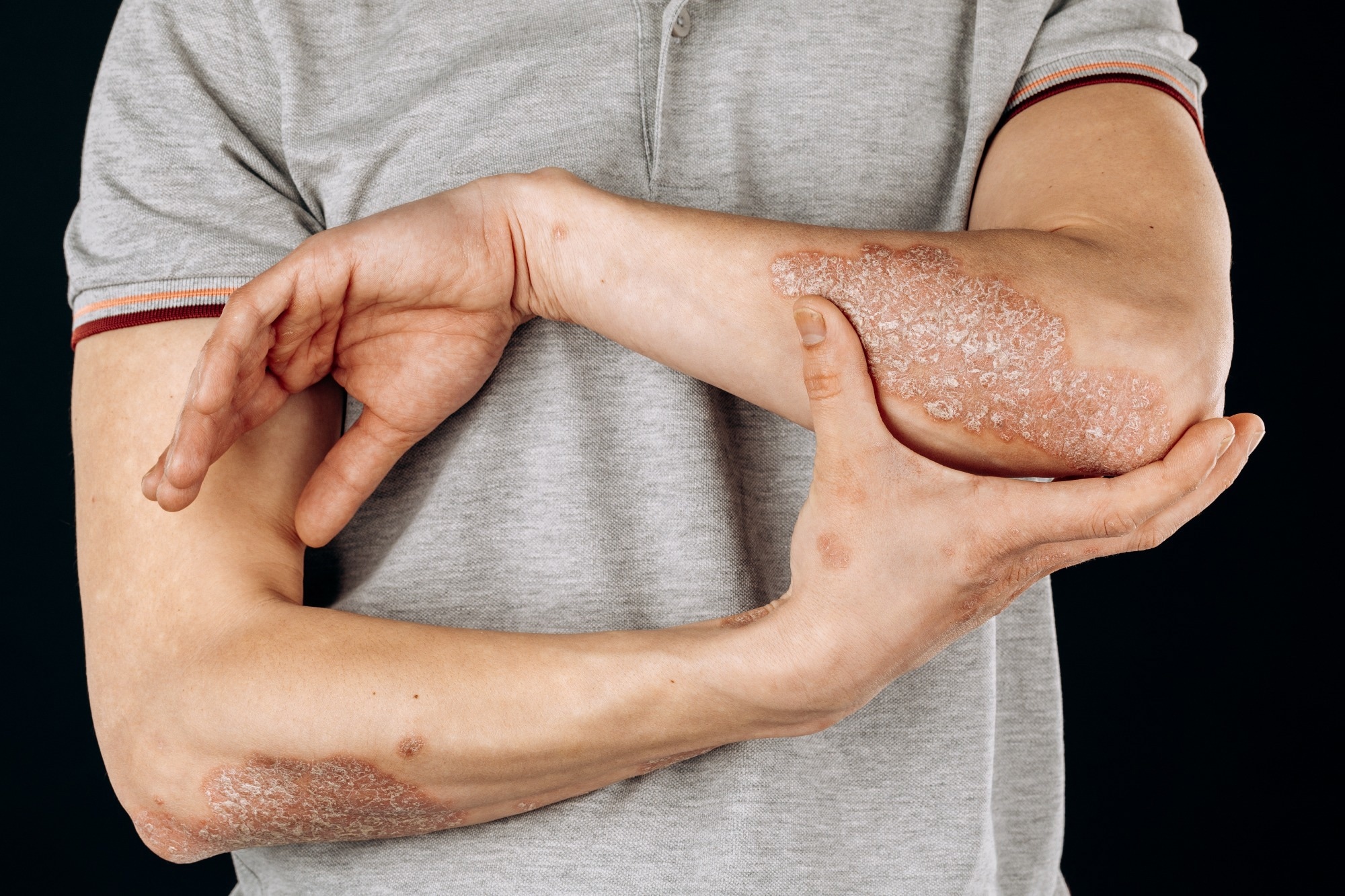While often promoted for health benefits, low-calorie diets may carry hidden inflammatory risks, as genetic evidence reveals a subtle link to psoriatic arthritis unseen in vegetarian and gluten-free patterns.

Study: Causal Relationships Between Popular Diets (Low-Calorie, Vegetarian, and Gluten-Free Diets) and Inflammatory Skin Diseases: A Mendelian Randomization Study. Image Credit: Fuss Sergey / Shuttertock
In a recent study published in the journal Clinical, Cosmetic and Investigational Dermatology, researchers investigated the possible causal relationships between three popular dietary patterns (vegetarian, gluten-free, and low-calorie) and common inflammatory skin diseases (such as psoriasis and acne).
Their findings indicate that low-calorie diets could increase the risk of developing psoriatic arthritis, with a modest effect size (OR 1.05, 95% CI 1.01–1.10, p=0.008). While gluten-free and vegetarian diets were not linked to any of the studied inflammatory skin diseases, further research is needed to confirm these findings.
Background
Inflammatory skin diseases like acne, psoriasis, psoriatic arthritis (PsA), and atopic dermatitis (AD) are chronic conditions involving immune dysregulation and inflammation, impacting patients' quality of life and mental health.
Despite advances in treatment, recurrence and chronic symptoms remain common, prompting interest in lifestyle-based interventions, particularly diet.
Popular dietary patterns like low-calorie, vegetarian, and gluten-free diets have gained attention due to perceived health benefits and growing media promotion.
Low-calorie diets may improve metabolic health and longevity, vegetarian diets provide antioxidants and fiber, and gluten-free diets help individuals with gluten-related disorders. However, poorly balanced diets can cause nutritional deficiencies that negatively affect skin health.
Previous clinical studies exploring diet–skin disease links have produced inconsistent results due to confounding factors and methodological limitations. Mendelian randomization (MR), which uses genetic variants as proxies for exposures, offers a more reliable approach to assessing causal relationships while minimizing bias and reverse causation.
About the Study
Researchers followed established reporting guidelines and used an MR design based on three core assumptions: genetic variants must be associated with the exposure (diet type), independent of confounders, and affect the outcome (skin disease) only through that exposure.
The exposures were three diet types (vegetarian, gluten-free, and low-calorie), and the outcomes were four inflammatory skin diseases (acne, psoriasis, AD, and PsA). Genetic data for the diets were obtained from the UK Biobank (64,949 participants), while disease data were sourced from large genome-wide association studies (GWAS) including up to 462,933 samples.
Single-nucleotide polymorphisms (SNPs) significantly associated with each diet were selected as instrumental variables, with only SNPs showing F-statistics above 10 included to ensure strength and validity.
Due to limited genome-wide significant variants, a relaxed significance threshold (p<5×10⁻⁵) with linkage disequilibrium clumping was applied, and MR-PRESSO was additionally used to conduct a global test for pleiotropy and identify potential outlier SNPs.
Five MR methods were applied, namely inverse variance weighted (IVW), MR-Egger, weighted median, simple mode, and weighted mode, with IVW as the main analytical approach.
Heterogeneity and horizontal pleiotropy were assessed using methods such as Cochran’s Q test and MR-Egger intercept.
Key Findings
The MR analysis using the IVW method found that a low-calorie diet had a statistically significant association with an increased risk of developing PsA (OR 1.05, 95% CI 1.01–1.10, p=0.008).
In contrast, vegetarian and gluten-free diets were not linked to a higher or lower risk of PsA. No significant causal relationships were found between any of the three diets and the other inflammatory skin diseases (psoriasis, acne, or AD).
Although heterogeneity was observed in the vegetarian diet–psoriasis analysis, a multiplicative random-effects IVW model was applied and confirmed no significant association. Sensitivity analyses, including MR-Egger regression, leave-one-out analysis, and funnel plots, indicated no evidence of horizontal pleiotropy or major bias.
The authors emphasized that the observed association was small, and that limited statistical power and potential measurement limitations in dietary phenotypes may have reduced the ability to detect subtle effects. No correction for multiple testing was applied, underscoring the need for caution.
Conclusions
This study is the first to use MR to explore causal relationships between popular dietary patterns and inflammatory skin diseases.
The findings indicate that a low-calorie diet may slightly increase the risk of psoriatic arthritis, while vegetarian and gluten-free diets show no significant effects on psoriasis, acne, or atopic dermatitis.
The authors suggest that prolonged calorie restriction might trigger nutrient deficiencies affecting immune balance and inflammation, possibly explaining the elevated PsA risk. This finding contrasts with common expectations that calorie restriction is uniformly anti-inflammatory, highlighting the complexity of dietary effects.
Key strengths include a genetically informed design that minimizes confounding and reverse causation. However, limitations such as lenient SNP selection thresholds, low statistical power, self-reported dietary data, potential sample overlap, absence of multiple-testing correction, and limited ethnic diversity restrict the generalizability of the findings.
Additionally, the small effect sizes and lack of multivariable adjustments mean results should be viewed as preliminary.
Future studies with larger, more diverse samples, better-defined dietary measures, and multivariable or mediation analyses are needed to confirm causal pathways. In conclusion, while the study suggests a possible link between low-calorie diets and PsA, these findings remain exploratory and require validation before informing dietary recommendations.
Journal reference:
- Yu, Y., Wang, S., Lin, J., Wu, Z., Zhang, Y., Wang, R., Wang, H. (2025). Causal Relationships Between Popular Diets (Low-Calorie, Vegetarian, and Gluten-Free Diets) and Inflammatory Skin Diseases: A Mendelian Randomization Study. Clinical, Cosmetic and Investigational Dermatology, 2025(18), 2605–2615. DOI: 10.2147/CCID.S538761 https://www.dovepress.com/causal-relationships-between-popular-diets-low-calorie-vegetarian-and--peer-reviewed-fulltext-article-CCID